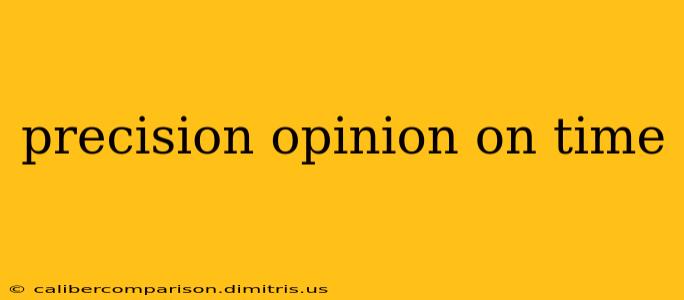Precision Opinion on Time: A Deep Dive into the Measurement and Perception of Time
Our perception of time is subjective, a fluid entity shaped by emotion, context, and even our biological clocks. Yet, the measurement of time demands precision, a quest for accuracy that has driven scientific and technological advancements for millennia. This exploration delves into the fascinating intersection of precision and our understanding of time, examining its multifaceted nature from atomic clocks to personal experiences.
The Quest for Accurate Time Measurement: From Sundials to Atomic Clocks
The journey towards precise timekeeping is a testament to human ingenuity. Early methods, like sundials and water clocks, were inherently imprecise, influenced by weather and variations in flow rates. Mechanical clocks, a significant leap forward, still suffered from limitations in accuracy due to friction and the irregularities of their moving parts.
The advent of the quartz crystal oscillator in the 20th century marked a turning point. Quartz crystals vibrate at a remarkably consistent frequency, providing a more stable time base. Quartz clocks, ubiquitous in everyday life, offer a level of precision previously unimaginable.
However, the pinnacle of timekeeping accuracy is undoubtedly the atomic clock. These devices utilize the incredibly precise and stable oscillations of atoms, specifically cesium-133, to define a second with breathtaking accuracy. Atomic clocks are the foundation of Coordinated Universal Time (UTC), the international standard for time, and are crucial for various applications, from GPS navigation to scientific research.
Beyond the Numbers: The Subjective Experience of Time
While the precise measurement of time is crucial for many aspects of modern life, the perception of time remains a deeply personal and subjective experience. Think of the adage, "Time flies when you're having fun," a sentiment universally understood. This subjective experience is influenced by various factors:
-
Attention and Engagement: When deeply engaged in an activity, time seems to pass more quickly. Conversely, boredom or anxiety can stretch time, making it feel slower.
-
Age: Our perception of time changes with age. Childhood often feels like an eternity, while time seems to accelerate as we grow older. This is partially attributed to the changing rate at which new experiences occur relative to the passage of time.
-
Emotion: Stressful or emotional events can distort our perception of time, making moments feel stretched or compressed.
-
Biological Rhythms: Our internal biological clocks, or circadian rhythms, significantly impact our perception and experience of time. These rhythms regulate various bodily functions, influencing our alertness, energy levels, and overall sense of timing.
The Future of Precision Timekeeping: Exploring New Frontiers
The pursuit of even greater precision in timekeeping continues. Researchers are exploring new technologies, such as optical clocks, which promise to surpass the accuracy of even the best atomic clocks. These advances will have profound implications for various fields, including:
-
Fundamental Physics: More precise timekeeping allows for more accurate testing of fundamental physical theories, potentially leading to breakthroughs in our understanding of the universe.
-
Navigation and Communication: Increased accuracy in timekeeping is crucial for GPS and other navigation systems, as well as for high-speed communication networks.
-
Scientific Research: Precise timekeeping is essential for numerous scientific experiments and observations, from astronomy to particle physics.
Conclusion: Precision and Perception in Harmony
The precision opinion on time encompasses both its objective measurement and its subjective experience. While atomic clocks provide an unparalleled standard for accuracy, the human experience of time remains a rich and complex tapestry woven from emotion, perception, and the ever-flowing river of our lives. Understanding both the precise measurement and the subjective perception of time is key to appreciating its multifaceted nature and its profound influence on our world.

